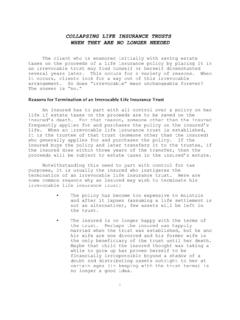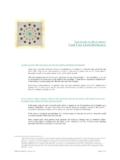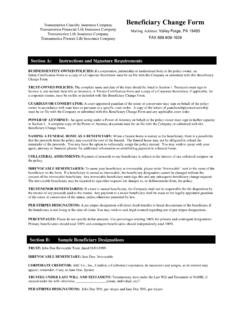Transcription of Transferring a Life Insurance Policy to an Irrevocable Trust
1 Page 1 of 3 Overview The Irrevocable life Insurance Trust (ILIT), when structured properly, is a staple of estate planning for high net worth families. An ILIT can provide a means to make leveraged transfers to heirs free of both estate and income tax. Ideally, the Trust is drafted prior to application for and purchase of the life Insurance Policy that it will eventually hold as its primary asset. However, circumstances may arise which result in a need to transfer an existing Policy into a Trust . In this event, special measures must be taken to preserve the income and estate tax benefits of the ILIT. Generally, Section 2035 of the Internal Revenue Code (Code) provides that a transfer of a Policy by an insured within three years of death will result in estate inclusion of all Policy proceeds. However, under Section 2035(d), the three-year inclusion rule does not apply to a bona fide sale for adequate and full consideration.
2 A sale of a Policy to a Trust , however, gives rise to its own set of issues, namely Policy valuation, Trust funding, and the transfer for value rule under Section 101(a) of the Code. Policy Valuation Since the three-year rule does not apply to a bona fide sale for adequate and full consideration, it is crucial that the Policy be appropriately valued otherwise, a Policy transferred for less than full value will be treated as a part gift/part sale. Such transfers would result in estate inclusion, under the three-year rule, of Policy proceeds in excess of the consideration received. A Policy should be sold for its fair market value. Generally speaking, the fair market value of a permanent Policy will be equal to its interpolated terminal reserve plus unearned premiums. (However, in the first year of a Policy s issue, the value typically will be premiums paid.) The value of a term Policy will generally be equivalent to unearned premium. This information can be obtained by requesting Form 712 from the Insurance carrier.
3 Note, however, that the carrier will typically not provide a precise value to be used for gift tax purposes. Information provided on Form 712 may serve as evidence of the fair market value price, but actual fair Transferring a life Insurance Policy to an Irrevocable Trust Page 2 of 3 market value may differ depending on the type of Policy in question and other outside factors present. For example, in the case where death of the insured is imminent, fair market value of the Policy may be closer to the death benefit face amount. Therefore, clients contemplating a sale should consult their CPA for guidance on valuation. If the situation warrants, the most conservative approach would be to obtain a professional appraisal. Trust Funding To effect a sale of a Policy to an Irrevocable Trust , the Trust will need to obtain the funds to purchase the Policy by some method. Typically, this can be accomplished through annual exclusion gifts to the Trust , or perhaps through a single lifetime applicable exclusion gift.
4 While a more aggressive planner might employ a promissory note, repayment at the applicable federal rate is still required. Of course, future annual gifts would then be needed to satisfy ongoing premiums and to service the note. Transfer for Value Rule While the bone fide sale strategy can prevent application of the three-year rule, it can trigger application of the transfer for value rule in the absence of proper planning. Under Section 101(a)(1) of the Code, transfer of a life Insurance Policy for valuable consideration results in the loss of the otherwise tax-free treatment of death proceeds. However, an exception to this transfer for value rule is where the Policy is transferred to the insured. The sale of a Policy to a grantor Trust (in which the insured is the grantor) would fall under this exception to the transfer for value rule. Rev. Rul. 85-13 suggests that an existing life Insurance Policy can be sold by a grantor to a grantor Trust without transfer for value issues, and Rev.
5 Rul. 2007-13 specifically provides that a non-grantor Trust s sale of an existing Policy to the insured s grantor Trust also falls into the exception. A "grantor Trust " is a Trust that treats the grantor as the owner of the Trust for income tax purposes. The owner must include all items of Trust income, gain, loss, deductions, and credits in calculating the owner's individual income tax liability. To create a grantor Trust , planners typically will grant one or more of several powers as listed in the Code to the grantor or a third person. For example, if the grantor or a third person has the right to acquire Trust assets in a non-fiduciary capacity by substituting assets of equivalent value, the Trust will be a grantor Trust [IRC 675(4)]. Of course, it is imperative to avoid certain powers that will cause the Trust to be a grantor Trust , but will also cause inclusion of the Trust in the grantor's estate for estate tax purposes. For example, a power to revoke the Trust causes grantor Trust status, but also causes inclusion [IRC 676(a), 2038(a)].
6 Besides avoiding transfer for value treatment, grantor Trust status has the added advantage of eliminating tax on sales of appreciated property between the grantor and the Trust (important if the Policy has built in gain), and taxable interest income is eliminated on notes between the grantor and Trust (although interest should still be paid on any notes for a debt to be respected). Page 3 of 3 Jerry Lorey, LUTCF, Member Agent of The Nautilus Group , a service of New York life Insurance Company, Registered Representative offeringsecurities through NYLIFE Securities LLC (Member FINRA/SIPC), a Licensed Insurance Agency, 405 Ashley Ridge Blvd. - Shreveport, LA 71106(318) 629-7500, Financial Adviser offering investment advisory services through Eagle Strategies LLC, a Registered Investment Adviser. TheSummit Group is not owned or operated by NYLIFE Securities LLC or its affiliates. The Summit Group as well as NYLIFE Securities LLC and itsaffiliates do not provide legal, tax or accounting material includes a discussion of one or more tax-related topics.
7 This tax-related discussion was prepared to assist in the promotion ormarketing of the transactions or matters addressed in this material. It is not intended (and cannot be used by any taxpayer) for the purpose ofavoiding any IRS penalties that may be imposed upon the taxpayer. Taxpayers should always seek and rely on the advice of their own independenttax professionals. Please understand that New York life Insurance Company, its affiliates and subsidiaries, and agents and employees of anythereof, may not provide legal or tax advice to you. 2015 New York life Insurance Company, all rights reserved. SMRU:521241 exp.






